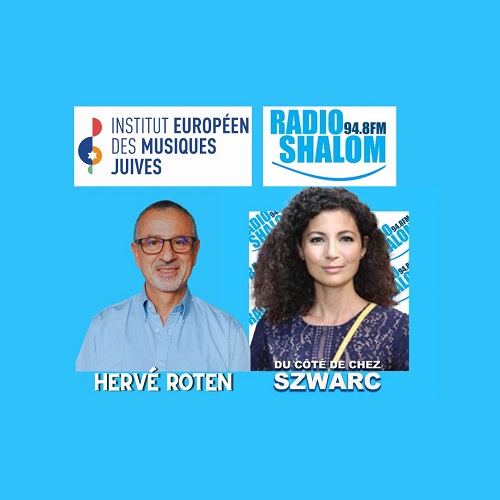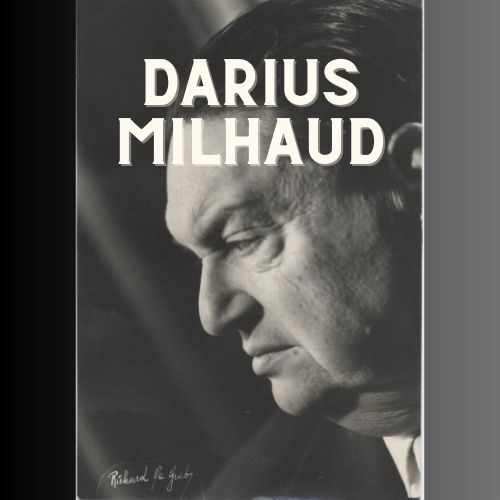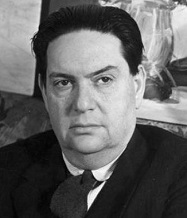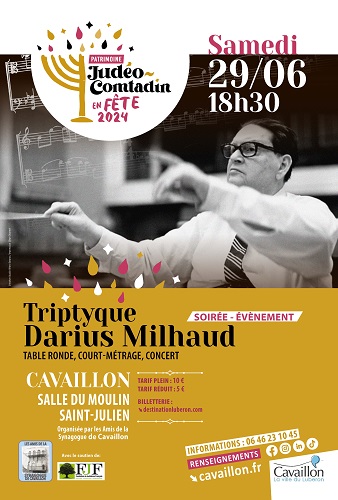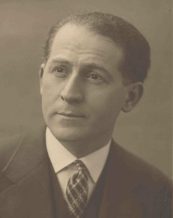
by Hervé Roten[1]This article is dedicated to the memory of Jacques Algazi, who passed away on March 1, 2021, 50 years to the day after his father’s death, and to Béatrice Algazi, his daughter, who kindly … Lire la suite
Son of Eliaquim Algazi and Visa Danon Tuvim, Léon Yehuda Algazi was born in Epuresti (Romania) on February 6, 1890, as indicated on his military record book[2]There is some doubt as to the exact date of Léon Algazi’s birth. His rabbinical diploma states February 13, 1890, but according to his son Jacques, February 11 was also sometimes mentioned in … Lire la suite. At the age of 11, he began teaching children younger than himself, as his family was very poor and had to emigrate to Bucharest. His father, who had been the director of a traveling theater troupe, became a grocer, but ended up going bankrupt by giving credit to poor peasants.
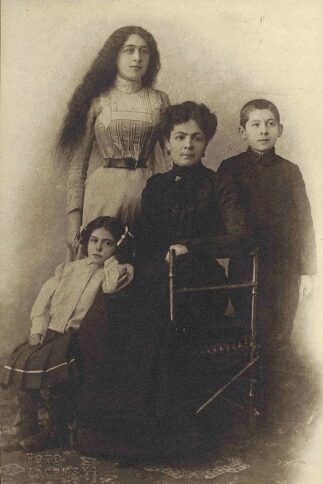
Léon Algazi showed an early aptitude for music. At the age of 5, gypsies carved his first violin out of a fir plank. Later, in Bucharest, he conducted his high school choir. In 1905, aged just 15, he set off for Jerusalem, making part of the journey on a donkey, to meet up with one of his mother’s uncles who was head of the Sephardic community. In the Holy City, Léon Algazi studied rabbinical studies for about a year and a half, before entering the Séminaire israélite de France on rue Vauquelin in Paris in 1908 to complete his theological studies. He remained there until August 4, 1914, when he enlisted as a volunteer nurse in the French army.
In 1919, having graduated from rabbinical school, Algazi went to Bucharest to take up a ministry. But the city’s chief rabbi, seeing him as a dangerous competitor, blocked his plans. On June 10, 1920, he founded the daily Luptätorul (“The Wrestler”), of which he was chief editor. The socialist-leaning paper was poorly received by the government, which finally banned it a year later. Léon Algazi went into exile in Vienna to study music with Arnold Schönberg, alongside Hanns Eisler and Karl Rankl, among others, and conducted the orchestra of the Vienna Jewish Theatre. But the establishment went bankrupt, and Algazi returned to Paris in 1923. There he met Alice Halphen, widow of the composer Fernand Halphen (1872-1917). This exceptional woman, who supported him throughout his career, introduced him to André Gédalge, who accepted him into his counterpoint and fugue class at the Conservatoire national de musique, where he rubbed shoulders with Darius Milhaud. After his mentor’s death in 1926, he continued his studies with Raoul Laparra and Charles Koechelin.
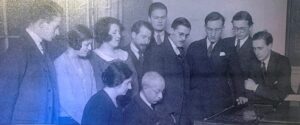
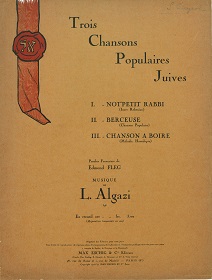
Fascinated by folklore [3]Algazi was in contact with his compatriot, the Romanian ethnomusicologist Constantin Brăiloiu, and closely followed the work of Abraham Zvi Idelsohn, the Father of Jewish musicology, in 1925 he published Trois chansons populaires juives (Max Eschig et Cie, Paris) with French lyrics by Edmond Fleg. In 1928, he wrote the incidental music for the Dibbouk for the Gaston Baty company. In 1929, he created the first weekly Jewish radio program, “La voix d’Israël”, which he hosted – except during the war years – until 1971. The program, which in 1948 took the name “Écoute Israël”, would be taken over by Victor Malka after his death.
In the early 1930s, Léon Algazi, with Vladimir Dyck, directed the “Mizmor” collection of Hebrew music published by Salabert. In 1933, he founded the Mizmor Choir, where he met his wife, Tatiana Kaganoff, whom he married on August 11 of that year. They had two children: Jacques Eliaquim Joseph Algazi, on September 25, 1934, and Irène Vida Fradé Algazi, on October 6, 1938.
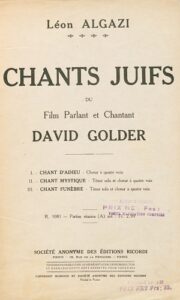
Algazi’s musicological publications, his lectures and the concerts he conducted all drew attention to him. In 1936, he was appointed Professor of History as well as of Theory of Hebrew Music at the Schola Cantorum, and Professor of Liturgical Music at the École Rabbinique de France. In 1937, with the support of composer Darius Milhaud, he became head of choirs at the Grande Synagogue de la Victoire and director of musical services at the Consistoire Israélite de Paris.
During the war, the Algazis fled to Lyon, [4]where Léon Algazi founded the Bureau d’Études Juives, an organization of some fifty Jewish intellectuals who wrote historical, economic, philosophical and literary works on Judaism and its … Lire la suite, before crossing into Switzerland on August 9, 1943. They found refuge in Fribourg, in a boarding house run by Franciscan nuns. Léon Algazi gives lectures on Jewish music and spirituality in various Swiss towns. He played the congregation’s harmonium until 1945.
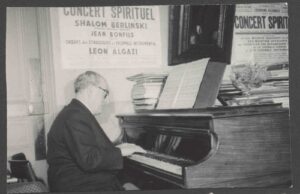
After the war, Léon Algazi returned to Paris and resumed his activities. As a journalist, radio producer, choral conductor, composer, music publisher, president of the Syndicat national des chefs d’orchestre pour la musique religieuse, teacher and director of the École israélite de pédagogie et de liturgie at the Séminaire israélite de France, he was bursting with energy and projects. A tireless worker, he wrote numerous articles on music and played an active role in building the Amitié judéo-chrétienne alongside Jules Isaac and Edmond Fleg. With Edmond Fleg, Léon Pougatch and Jean Halpérin, he created the first Colloque des Intellectuels juifs de langue française, on May 24, 1957. Finally, he convened the first International Congress of Jewish Music in Paris from November 4 to 13, 1957.
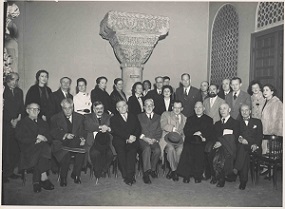
Appointed Director of Music for the Consistorial Temples in 1961, Léon Algazi died on Monday March 1, 1971, after suffering a ruptured aortic aneurysm, while preparing a radio broadcast on Paul Claudel, scheduled for the following Sunday.
Léon Algazi left to posterity a protean and still too little-known body of work: among his liturgical and folkloric compositions thee are the Service sacré[5]The Service sacré was commissioned by Temple Emanu-El in New York. The author himself conducted the first performance in March 1952. The French premiere took place at Salle Gaveau on March 21, 1955, … Lire la suite orchestral suites (Suite hassidique, 1948), psalms and other synagogue music, harmonizations of traditional songs (Trois chansons populaires juives, 1925 ; Trois chants traditionnels hébraïques, 1929; Quatre mélodies judéo-espagnoles, 1945), and, more anecdotally, music for film (David Golder, 1931) or theater (Le Dibbouk, 1928; Joe et Compagnie, 1930; Maître après Dieu, 1948; Athalie, 1955). Of Sephardic origin, Léon Algazi also collected Judeo-Spanish songs, collected in an anthology (Chants séphardis, London, 1958).

- Listen to the playlist : The music of Léon Algazi
- Consult the description of the Léon Algazi archives
- Browse our archives on Léon Algazi
- Watch the video : Léon Algazi (1890-1971), a Jewish music pioneer in France
| 1 | This article is dedicated to the memory of Jacques Algazi, who passed away on March 1, 2021, 50 years to the day after his father’s death, and to Béatrice Algazi, his daughter, who kindly provided me with many of the elements I used to write this tribute. |
|---|---|
| 2 | There is some doubt as to the exact date of Léon Algazi’s birth. His rabbinical diploma states February 13, 1890, but according to his son Jacques, February 11 was also sometimes mentioned in his family. |
| 3 | Algazi was in contact with his compatriot, the Romanian ethnomusicologist Constantin Brăiloiu, and closely followed the work of Abraham Zvi Idelsohn, the Father of Jewish musicology |
| 4 | where Léon Algazi founded the Bureau d’Études Juives, an organization of some fifty Jewish intellectuals who wrote historical, economic, philosophical and literary works on Judaism and its contribution to French society. Catholics and Protestants also took part in the bureau’s work |
| 5 | The Service sacré was commissioned by Temple Emanu-El in New York. The author himself conducted the first performance in March 1952. The French premiere took place at Salle Gaveau on March 21, 1955, again conducted by Algazi. |
